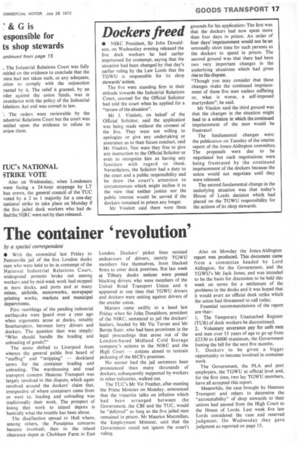[& G is responsible
Page 17

Page 19

If you've noticed an error in this article please click here to report it so we can fix it.
or its shop stewards
I The TGWU is responsible for actions its shop stewards, the House of Lords iled on Wednesday.
This final decision, of great importance, :verses the Appeal Court ruling last month means fines totalling £55,000, imposed y the Industrial Court, will have to be paid y the union after all.
The five Law Lords unanimously allowed le appeal by Heatons Transport (St ielens) Ltd, Craddock Bros of, Volverhampton, Panalpina Services Ltd nd Panalpina (Northern) Ltd of Bradford, gainst Appeal Court decision absolving the nion from liability for blacking lorries at lull and Liverpool docks. The union was rdered to pay the costs of the Lords ppeal, estimated at £25,000.
:ighit appeals allowed
The Law Lords decided the union was :sponsible for the actions of its shop tewards in calling upon union members to lack lorries of the three container firms. Altogether the Law Lords — Lord Wilberforce, Lord Pearson, Lord Diplock, Lord Cross of Chelsea and Lord Salmon — allowed eight appeals by the three firms.
Summarizing the effect of Wednesday's Lords judgment, Lord Wilberforce said: 1. That "in accordance with a policy of devolution" followed by the union, and consistently with its rules and practice, shop stewards of the union have a general applied authority to act in the interest of the members they represent and in particular to defend and improve their rates of pay and working conditions. They could do so by negotiation or by industrial action at the relevant place of work. They were not authorized to do any act outside union rules or policy.
2. It was at the material time union policy to retain work in connection with containers otherwise than at manufacturers' premises, for dock workers, and to prevent other workers from doing such work.
3. Shop stewards representing dock workers had implied authority to take industrial action at their place of work in furtherance of that policy. That included the blacking of haulier firms.
4. The NIRC was fully entitled on the evidence before it to conclude that the union, through its shop stewards, had been guilty of an unfair industrial practice and to issue orders restraining the continuation of that practice.
5. As soon as orders of the Industrial Relations Court were issued restraining the union itself or by its officers, servants and agents from continuing such practice, the union became responsible for taking all possible steps to stop the blacking, including the unequivocal withdrawal of the shop stewards' authority and if necessary taking disciplinary action. . The Industrial Relations Court was fully ntitled on the evidence to conclude that the Mon had not taken such, or any adequate, ction to comply with the unjunction ranted by it. The relief it granted, by an irder against the union funds, was in .ccordance with the policy of the Industrial telations Act and was correct in law.
r. The orders were reviewable by the ndustrial Relations Court but the court was :ntitled upon the evidence to refuse to .eview them.




























































































